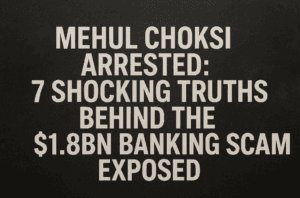Mehul Choksi Arrested: 7 Shocking Truths Behind the $1.8bn Banking Scam Exposed
Indian diamond magnate Mehul Choksi’s arrest in Belgium over a $1.8bn Punjab National Bank (PNB) fraud case marks a critical juncture in a sprawling financial scandal. Choksi, alongside nephew Nirav Modi, allegedly exploited banking loopholes to secure illicit loans, fleeing India in 2018 before settling in Antigua, where he obtained citizenship. His arrest follows India’s persistent extradition efforts, though his legal team contests the move, citing health risks and political bias.
The case—a symbol of India’s struggle against high-profile economic crimes—has exposed systemic banking vulnerabilities, eroded public trust, and spotlighted challenges in cross-border justice. While reforms like stricter auditing emerged post-scandal, minimal fund recovery underscores lingering accountability gaps. Choksi’s fate now hinges on Belgium’s assessment of India’s judicial fairness, reigniting debates about wealth, power, and global accountability in white-collar crime.

Mehul Choksi Arrested: 7 Shocking Truths Behind the $1.8bn Banking Scam Exposed
Indian diamond tycoon Mehul Choksi’s recent arrest in Belgium marks a pivotal moment in a years-long saga of alleged financial fraud. Wanted in India for his role in a $1.8bn scam at Punjab National Bank (PNB), Choksi’s detention reignites discussions about accountability, international justice, and the challenges of prosecuting white-collar crime across borders.
The PNB Scam: A Breach of Trust
At the heart of the scandal lies a sophisticated scheme involving fraudulent Letters of Undertaking (LoUs)—essentially bank guarantees—issued by rogue PNB employees between 2011 and 2017. Choksi and his nephew, Nirav Modi, allegedly exploited loopholes in India’s banking protocols to secure credit for overseas transactions, which were then diverted through shell companies. The scam, one of India’s largest financial frauds, exposed systemic vulnerabilities in banking oversight and raised questions about corporate governance.
The Fugitives: From Celebrity Ties to Global Hideouts
Before their fall from grace, Choksi and Modi were luminaries in the jewelry world. Modi’s brand adorned Hollywood stars like Kate Winslet, while Choksi’s Gitanjali Gems dominated India’s retail market. Their 2018 flee from India—Choksi to Antigua, where he obtained citizenship, and Modi to the UK—highlighted the ease with which wealth and influence can facilitate evasion. Modi’s ongoing extradition battle in London underscores the legal complexities of such cases.
Choksi’s Legal Quagmire: Health, Politics, and Extradition
Choksi’s arrest in Belgium, based on 2018 and 2021 Indian warrants, sets the stage for a contentious legal battle. His defense team cites severe health issues, including cancer treatment, and alleges political motivations behind the charges. Extradition proceedings will hinge on Belgium’s assessment of India’s judicial fairness and the validity of evidence—a common hurdle in high-stakes economic crime cases.
Parallels and Precedents: The Nirav Modi Case
Nirav Modi’s protracted extradition process in the UK offers a roadmap for Choksi’s case. Both defendants argue against returning to India, citing prison conditions and biased trials. However, Modi’s failed appeals, culminating in a 2021 UK court ruling, suggest that Choksi’s health claims may face rigorous scrutiny. The outcomes could influence how nations balance humanitarian concerns with legal obligations.
Broader Implications: Banking Reforms and Public Trust
The PNB fraud spurred India to tighten banking regulations, including stricter LoU oversight and digital auditing. Yet, the slow pace of recovery—only a fraction of the $1.8bn has been reclaimed—fuels public skepticism. The case underscores the need for global cooperation in asset recovery and the role of agencies like the Enforcement Directorate (ED) in tackling financial crime.
Whistleblowers and the Human Cost
Behind the headlines are untold stories of impacted employees, investors, and whistleblowers like Hariprasad SV, whose early warnings were initially ignored. His advocacy highlights systemic gaps in protecting those who expose corruption—a critical issue as India seeks to rebuild institutional credibility.
Conclusion: A Test of International Justice
Choksi’s arrest is more than a legal milestone; it tests the resolve of nations to hold economic offenders accountable. As Belgium weighs India’s extradition request, the world watches whether justice will transcend borders, or if wealth and legal maneuvering will continue to shield the powerful. For India, the case is a litmus test of its ability to reform and restore faith in its financial systems.
What’s Next?
The coming months will reveal whether Choksi returns to face trial or prolongs his stay abroad through appeals. Either way, the saga underscores a universal truth: in an interconnected world, financial crimes demand global solutions—and the pursuit of justice is anything but straightforward.
You must be logged in to post a comment.